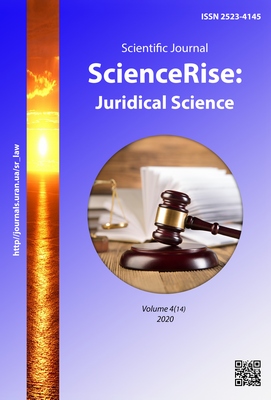Change and termination of the agreement, from the point of view of different legal doctrines, in the event of circumstances of force major
DOI:
https://doi.org/10.15587/2523-4153.2020.219350Keywords:
Force majeure, force majeure, conclusion of a contract, change of a contract, termination of a contract, conditions, obligationsAbstract
Force majeure (force majeure) can cause a significant change in circumstances, which is the basis for termination or change of the contract, and, ultimately, leads to the termination of the obligation (its termination) or the preservation of the obligation in a modified form. Legal regulation of the legal consequences of a significant change in the circumstances that exist at the conclusion of the contract is usually based on one of two key principles of contract law: the principle, according to which contracts must be performed (pacta sunt servanda), or clause (clausula rebus sic stantibus). The legislation of foreign countries contains rules, according to which "a change of circumstances may justify a change in the contract, when the preservation of the contract in its original form leads to extraordinary results, incompatible with justice" [1]. The main consequences of a significant change in the circumstances that guided the parties in concluding the contract are: - actually change the contract, ie change the terms of the contract (and as a consequence - the obligations between the parties) while maintaining the contract in force; - and termination of the contract by agreement of the parties.
If the parties do not agree to bring the contract in line with the circumstances that have changed significantly, or to terminate it, the contract may be terminated on the grounds, established by the Central Committee of Ukraine, amended by a court decision at the request of the interested party: at the conclusion of the contract the parties proceeded from the fact that such a change of circumstances will not occur; the change of circumstances is due to reasons, which the interested party could not eliminate after their occurrence with all the care and diligence, required of itReferences
- Tsvaigert, K., Ketts, Kh. (2000). Vvedenie v sravnitelnoe pravovedenie v sferechasnogo prava. Vol. 2. Moscow: Mezhdunarod. otnosheniia, 480.
- Ioffe, O. S. (1955). Otvetstvennost po sovetskomu grazhdanskomu pravu. Leningrad: Izd-voLeningradskogo un-ta, 311.
- Rakhmilovich, V. A. (1964). O protivopravovnosti kak osnovanii grazhdanskoi otvetstvennosti. Sovetskoe gosudarstvo i pravo, 3, 58–59.
- Oigenzikht, V. A. (1972). Problema riska v grazhdanskom prave. Dushanbe, 224.
- Konovalov, S. A. (2006). Osnovanie grazhdansko-pravovoi otvetstvennosti. Moscow, 246.
- Komarov, A. S. (2007). Otvetstvennost v kommercheskom oborote Moscow: Mysl.
- Melnik, O. O. (2016). Zasterezhennia pro nezmіnnіst obstavin dogovoru ta fors-mazhor u tsivіlnomu pravі Ukraini. Natsionalnii iuridicheskii zhurnal: teoriia i praktika, 2/1 (18), 76–78.
- Popov, N. V. (2003). Teoreticheskie i prakticheskie voprosy izmeneniia i rastorzheniia grazhdansko-pravovogo dogovora v sviazi s izmeneniem obstoiatelstv. Moscow, 170.
- Melnyk, O. O.; Kharytonova, Ye. O. (Ed.) (2013). Klasyfikatsiia ryzykiv u tsyvilnomu pravi Ukrainy. Nova redaktsiia Konstytutsii Ukrainy ta vdoskonalennia tsyvilnoho zakonodavstva: problemy harmonizatsii: materialy kruhloho stolu. Odesa: Feniks.
- Sobchak, A. A. (1968). O nekotorykh obschin voprosakh teorii pravovoi otvestvennosti. Izvestiia vuzov. Pravovedenie, 3.
- Likhovidov, K. (2001). Risk kak uslovie differentsiatsii i obema mer iuridicheskoi otvetstvennosti. Zakonnost, 12.
- Vlasova, A. S. (2009). Risk kak priznak predprinimatelskoi deiatelnosti. Moscow, 209.
- Mikhailov, V. I. (2000). Risk v biznese. Zakon, 7, 53.
- Pro praktyku zastosuvannia sudamy zakonodavstva pry vyrishenni sporiv iz zoboviazan, shcho vynykaiut iz dohovoriv ta inshykh pravochyniv (2012). Lyst Vyshchoho Spetsializovanoho Sudu z rozghliadu tsyvilnykh i kryminalnykh sprav No. 10-1390/0/4-12. 27.09.2012. Ofitsiinyi veb-sait Verkhovnoi Rady Ukrainy. Available at: http://zakon5.rada.gov.ua/laws/show/v1390740-12
- Pro vnesennia zmin do deiakykh zakonodavchykh aktiv Ukrainy, spriamovanykh na zabezpechennia dodatkovykh sotsialnykh ta ekonomichnykh harantii u zviazku z poshyrenniam koronavirusnoi khvoroby (COVID-19) (2020). Zakon Ukrainy No. 540-IX. 30.03.2020. Available at: https://zakon.rada.gov.ua/laws/show/540-20/stru#Stru
Downloads
Published
How to Cite
Issue
Section
License
Copyright (c) 2020 Olga Melnyk

This work is licensed under a Creative Commons Attribution 4.0 International License.
Our journal abides by the Creative Commons CC BY copyright rights and permissions for open access journals.
Authors, who are published in this journal, agree to the following conditions:
1. The authors reserve the right to authorship of the work and pass the first publication right of this work to the journal under the terms of a Creative Commons CC BY, which allows others to freely distribute the published research with the obligatory reference to the authors of the original work and the first publication of the work in this journal.
2. The authors have the right to conclude separate supplement agreements that relate to non-exclusive work distribution in the form in which it has been published by the journal (for example, to upload the work to the online storage of the journal or publish it as part of a monograph), provided that the reference to the first publication of the work in this journal is included.









